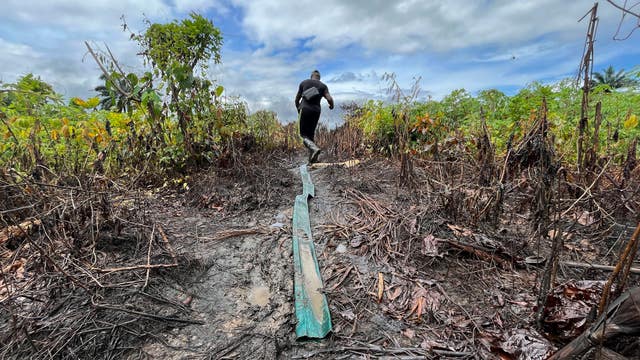An explosion and fire at an illegal oil refinery site in Nigeria’s Niger Delta region killed at least 15 people, including a pregnant woman, residents and a local environmental rights group has reported.
The blast happened on Monday in the southern River state’s Emohua district, where illegal refineries are common. Residents said the death toll was likely to grow because many of the bodies were completely burned and dozens of people were injured.
Police confirmed the incident but did not provide details of what happened. Locals said most of the people who died had worked at the illegal refinery in the village of Rumucholu.
The workers at the site were refining oil taken from a vandalised pipe, according to Chima Avadi, a local activist. “When they scoop from the point where they vandalised the pipe, they will take to where they were cooking. That is how fire got there,” Mr Avadi said.

Dozens of people were being treated in hospitals, he said. A pregnant woman was among the 15 victims confirmed dead, according to a statement issued by the Youths and Environmental Advocacy Centre, a local environmental rights group.
Explosions at locally run refineries are common in the oil-rich but impoverished Niger Delta region, where where most of the nation’s oil facilities are targeted by chronic oil theft.
Operators often avoid regulators by setting up refineries in remote areas. The workers at such facilities rarely adhere to safety standards, leading to frequent fires, including one in Imo state last year that killed more than 100 people.
“The money they make from there in one or two days is more than what a civil servant can make in a year,” Youths and Environmental Advocacy Centre executive director Fyneface Dumnamene said.
His group has been advocating for environmental reforms and an end to the illegal activities. But amid growing economic hardship in Nigeria, “people are looking for opportunities to make ends meet,” Mr Dumnamene said.
Nigeria lost at least 3 billion US dollars (£2.48 billion) worth of crude oil to theft between January 2021 and February 2022, the Nigerian Upstream Petroleum Regulatory Commission said last year.
As one of Africa’s top oil producers, Nigeria gets most of its wealth from the Niger Delta region. However, residents say their communities lack basic amenities and they feel abandoned by the government.
